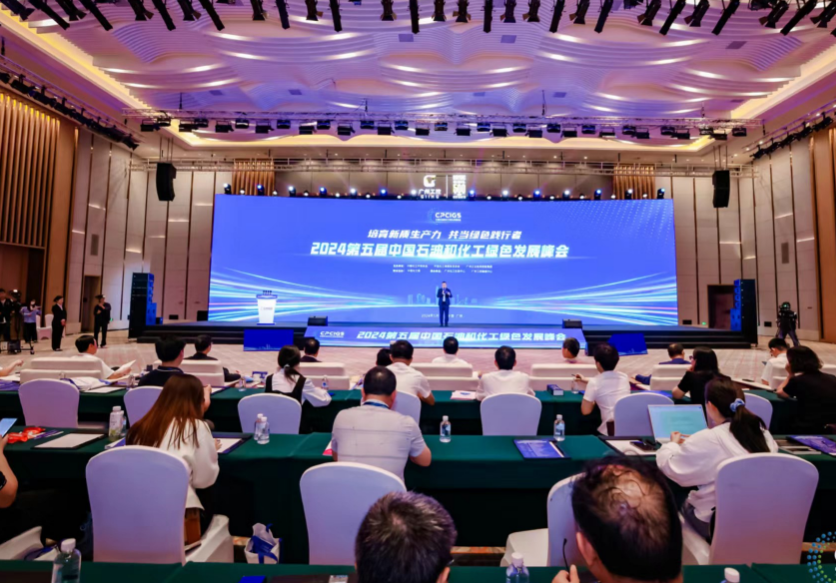The petrochemical industry jointly explores new paths for carbon reduction through digital means
Polish the green hue for high-quality development and add impetus to the cultivation of new quality productive forces
Sinochem News: To activate the power engine for the green, low-carbon and high-quality development of the industry, it is necessary to adjust development factors and cultivate the "digital" gene. On May 30th, at the 2024 5th China Petroleum and Chemical Green Development Summit held in Guangzhou, which was jointly organized by the China Chemical Environmental Protection Association, the China Chemical Intelligence and Information Association, and the Guangzhou Industrial Investment Holding Group, and co-organized by China Chemical Industry News Co., LTD., experts attending the summit provided the above suggestions on how to break through the problems and set the stage for high-quality development with new quality productivity.

Zhou Xianhui, the president of the China Chemical Industry Environmental Protection Association, pointed out that the petrochemical industry has a natural advantage in cultivating new quality productivity and achieving green development. Promoting transformation and upgrading through high-end development, reducing and eliminating environmental pollution through clean production, driving an energy revolution through low-carbon transformation, achieving resource conservation through circular transformation, and leading high-quality development with digital transformation will accelerate the pace of the industry's realization of green and sustainable development.
Tian Lei, a researcher at the Energy Institute of the Chinese Academy of Macroeconomic Research, pointed out that building a new energy system is crucial to long-term competitiveness. At present, the main contradiction in China's energy sector has shifted from "the total energy volume being insufficient to support economic and social development" to "the high-carbon structure of energy supply restricting economic and social development". In the future, adjustments should be made around five elements: industrial layout, product structure, process route, energy efficiency and energy sources, to optimize the energy structure layout and achieve green transformation and upgrading.
Academician Peng Xiaojun of the Chinese Academy of Sciences and a professor at Shenzhen University stated that high-end, green and intelligent development are the trends of fine chemicals, and intelligence is an important means to achieve high-end and green development. China is transitioning from "Fine Chemicals 1.0" to "Fine Chemicals 2.0", characterized by intelligent molecular functions, intelligent molecular design, and intelligent molecular manufacturing, and has achieved industrial leapfrog development in several fields.
Wu Zhongze, former member of the Party Group and vice minister of the Ministry of Science and Technology and former head of the Central Commission for Discipline Inspection's resident disciplinary inspection group at the Ministry of Science and Technology, said at the meeting that generative artificial intelligence can empower product research and development, intelligent manufacturing, intelligent marketing services and other links. The in-depth application of generative artificial intelligence by petrochemical enterprises will bring about new technological breakthroughs as well as innovations in application scenarios and business models. It will not only reduce costs and increase efficiency but also enhance the comprehensive utilization rate of waste and improve safety and environmental protection levels.
Song Xianzhu, former deputy director of the Raw Materials Industry Department of the Ministry of Industry and Information Technology and current president of the China Computer Users Association, pointed out that the digital economy provides strong support for accelerating the formation of new quality productive forces. The digital transformation of industries can address the uncertainties such as the complexity of production processes and the diversification of market demands through six aspects: filling the gaps in core technologies, building industrial Internet platforms, accelerating enterprises' adoption of cloud computing, fostering new models and business forms, establishing cross-border collaborative ecosystems, and strengthening public service support.
Luo Xiang, the chairperson of the ESG and Carbon Neutrality Investment Steering Committee of the United Nations Industrial Development Organization's Global Innovation Network Project, stated that digital and intelligent transformation and green and low-carbon transformation do not develop in isolation but rather penetrate and integrate with each other. Without digital transformation, enterprises' energy consumption cannot be reduced, and they cannot achieve green and low-carbon transformation. He said, "The essence of carbon neutrality is to adjust the structure - to adjust the economic structure, energy structure, and even the financial structure." Only by ensuring that the entire life cycle, from production, consumption to supply chain, is green can carbon neutrality be achieved.
